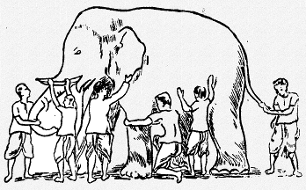Offices and telephone:
899 Skokie Boulevard, Suite 220
Northbrook, Illinois 60062
Call or text (847) 707-0657
Email: rgilbert@rorygilbert.com
If you require a more immediate response or would like to send a text, my cell number is
(847) 707-0657

Offices and telephone:
899 Skokie Boulevard, Suite 220
Northbrook, Illinois 60062
Call or text (847) 707-0657
Email: rgilbert@rorygilbert.com
If you require a more immediate response or would like to send a text, my cell number is
(847) 707-0657

 I hesitate to make broad generalizations about the differences between the sexes because there are so many exceptions to the rule, but there are patterns that occur with enough frequency that they are worth noting. When people are experiencing difficulties in their personal lives, they tend to get their needs met in one of two dysfunctional ways that represent opposite ends of a continuum. On one end are those individuals who place the needs of others in front of their own. The majority of people on this side of the continuum are women. They fall into the trap of believing that, if their loved ones are happy, then they will find happiness themselves and that their partners will reciprocate the love and attention that was bestowed upon them. The problem is that this love and attention is often not reciprocated. They are often taken advantage of in their relationships and in the extreme become victims.
I hesitate to make broad generalizations about the differences between the sexes because there are so many exceptions to the rule, but there are patterns that occur with enough frequency that they are worth noting. When people are experiencing difficulties in their personal lives, they tend to get their needs met in one of two dysfunctional ways that represent opposite ends of a continuum. On one end are those individuals who place the needs of others in front of their own. The majority of people on this side of the continuum are women. They fall into the trap of believing that, if their loved ones are happy, then they will find happiness themselves and that their partners will reciprocate the love and attention that was bestowed upon them. The problem is that this love and attention is often not reciprocated. They are often taken advantage of in their relationships and in the extreme become victims.
The other end of the continuum, which is comprised mostly of men, contains those individuals who see to it their needs and wishes are met regardless of the consequences this has on others. These people will knowingly, or often not knowingly, take advantage of others in order to get their way. This tendency to put their own needs first can become selfish and self-centered and even abusive in the extreme.
My goal is to assist people at both ends of this continuum find a happy medium. I help the women who have the potential of being victimized develop better ways of getting their own needs met and to become equipped to protect themselves from the selfishness of their husbands or boyfriends. Concerning the men who operate in a self-centered or abusive manner, I help them develop a more sensitive and respectful way of interacting with their wives or girlfriends and learn more self-control and patience in response to their own needs.

 Holding out for the ideal mate is crucial to attaining a truly satisfying and enduring relationship. It’s never a good idea to settle for less when it comes to love. When you can’t find the person who’s right for you, dating gets tiresome and discouraging. It’s easy to lose hope that you’ll ever find the right person, but that’s no reason to settle for someone who is not your Mr. or Ms. Right.
Holding out for the ideal mate is crucial to attaining a truly satisfying and enduring relationship. It’s never a good idea to settle for less when it comes to love. When you can’t find the person who’s right for you, dating gets tiresome and discouraging. It’s easy to lose hope that you’ll ever find the right person, but that’s no reason to settle for someone who is not your Mr. or Ms. Right.
Dating is no exception to life’s rules. When I was first out of grad school, I thought that I was hot stuff because the agency I worked for offered me a starting salary of $12,000 and I was able to talk them into $12,500. Even in those days, that wasn’t much money. I was able to manage, but I didn’t have much left over at the end of the month and I certainly didn’t have anything extra to spend on clothes. Â Wearing the same thing day after day bugged the hell out of me. These were the days when men were expected to wear a coat and tie to work. In grad school I was able to get by at my internship with a blue blazer and a couple of ties, but working full time at an agency in the Loop was a different story. I was painfully aware that my one sport coat wasn’t cutting it. One day at lunch I passed a men’s store with a big sign in the window, “Lost Our Lease. Everything Must Go. Prices Slashed.” I went in and found a beautiful tweed coat that fit great and was going for a fraction of the original price. I didn’t particularly like the lapels, but the deal was too good to pass up. I took it home, put it on, and showed my girlfriend (who now happens to be my wife). She looked at me, looked at the lapels, looked back at me, and then asked me with a tone of disbelief, “What’s with the lapels?” My heart sank. I was crushed and was never able to bring myself to take the coat out of the closet again.
I wouldn’t exactly say that I learned this lesson at the school of hard knocks, but that is how I learned the hard way to hold out for what you really want. Settling for less brings heartache and grief. The goofy thing is that people tend to apply this principle to the mundane aspects of life but not to something as important as love. It kills me when I’m talking to someone who describes the lengths that they undertook to obtain the latest iPhone, but are willing to overlook traits in their partners that they don’t like.
The response that I usually get when I point this out is “but nobody’s perfect.” Â Hold on with that one. The iPhone will be replaced in a year. It’s not perfect, but it is the ideal for the time being. I know that to a techie the latest model is invaluable, Â but let’s put this in perspective. We shouldn’t have a higher standard for electronics than we do for someone whom we could potentially marry and spend the rest of our lives with.
Once people move beyond the “nobody’s perfect” concern, they often worry that they are being too fussy. This is the point where I often hear friends and family quoted. For example, many a well-meaning, but anxious, mother has been known to exclaim, “You’re never going to find anyone if you’re going to be so picky.” It’s easy to understand the anxiety that would prompt this statement, but nevertheless, it is not a good message.
Not only can pressure from friends and family and pressure that you put on yourself cause you to settle for the wrong person, it can also make you overlook flaws with the rationale that you are setting too high a standard. (BTW, psychologically speaking, the mechanism of overlooking flaws or minimizing their importance is denial. That’s the same defense mechanism that permits the alcoholic to declare that his/her drinking isn’t that big of a deal.”) Many people at this juncture echo the concerns of the mother’s statement from above. they declare that the person they are seeing is “really a good person” and question whether they are nitpicking by being hung up on seemingly trivial things. Being too fussy is rarely the problem. If you’re at a restaurant and you don’t like the gazpacho, you’re not being too fussy. The soup is not right for your palate. To overlook this fact would be disrespectful to your own unique, personal taste.
Let’s talk about a rule that I like to call “if it gets under your skin then it’s a big deal.” When you have an under-your-skin reaction to something, it almost certainly indicates that the offending trait is symptomatic of a larger issue. Having the confidence to respect your gut reactions is a sign of a high self-esteem. Stating “I’m being superficial” is a put down to yourself and it ignores what your guts are trying to tell you. This is an easy trap to fall into because the offending trait can, at first, seem trivial. Typical examples of things that seem minor but may represent a significant problem include being turned off by your date’s car, clothes, or haircut. I believe that it’s crucial that you trust yourself enough to recognize that if these things grate on you they are the tips of much bigger icebergs.
Laura, a client of mine, found herself in this situation. Despite being attractive and having a great personality her well had run dry in the dating department. She’d been very excited about a new prospect that she’d met on Match.com. He met all of her specs—he was good looking, had a good career, and their predate Internet banter had been going well. However, when I saw her after their date, the first words that poured out her mouth in utter exasperation were, “He drives a Yugo!” Of particular note was the next statement that Laura, an Audi owner made, “I wish I weren’t so superficial. What difference does it make what car he drives?” I felt that the comment was way off base. I don’t believe that I or anyone else who knows her would ever consider her to be superficial. Yet, this is where she landed and she was really kicking herself.
When I was able to get her to stop berating herself and take a more objective view of her date, she was able to identify things that she had noticed on some level but had not fully appreciated the significance of. That is, his economic choice of vehicle was part of a pattern (tip of the iceberg) that ran throughout his life. The highlight of a recent trip to Europe had been the deal he got on a hotel room; his greatest source of pride concerned his ability to find bargains that were “better than Costco”; and he showed their waiter his appreciation with a nine per cent tip. There is nothing wrong with this man’s frugality (although the lousy tip really is pretty cheap), but it is not right for Laura. I believe that her ability to accept her true feelings is a sign of self-respect and a high self-esteem. Her Superman will almost certainly buy his cape at Nordstroms.
This post is already way longer than I had intended but I would be remiss if I didn’t make connections between my advice on dating and something that was a part of my childhood, the 1960s TV show, “Lost In Space.” Way before I had heard of Freud or Jung, I was painfully aware of Dr. Zachary Smith. You folks of my generation may recall that Dr. Smith was the lead scientist on the Jupiter 2, the spaceship occupied by the Robinson family and crew on “Lost In Space.” The show was about the Robinsons et al. who were, as the name states, lost in space, trying to get back to earth. The way that I remember it, there was a formula that was repeated every week. Each episode would begin with the ship landing on a strange planet where all of the capable, competent adults, i.e. all of the adults but the loathsome Dr. Smith, had a job to do repairing the ship.
This left nine year-old Will Robinson with nothing to do. He would ask his mother if he could go with Dr. Smith to explore the planet. It should be noted that Dr. Smith was a weasley, cowardly guy who couldn’t help but cause problems wherever he went. I’m not sure what Will’s mother was thinking but she would let Will go off with Dr. Smith under the conditions that they promise not to go too far and that they take the robot with them for protection. Everybody who ever saw the show remembers the robot. He was this big lovable guy who would start flapping his accordion-style arms when he got excited. Off the three of them would go and before long the robot would stop short and start flapping those arms, shouting, “Danger. Danger Will Robinson. Danger!” Will would ask, “What is it? What is it?” To which the robot would respond, “Does not compute. Need more data.” This meant that he didn’t have enough information to know the exact nature of the danger, but nevertheless, his sensors were telling that there was a problem.
I believe that we all have something inside us analogous to the robot. Call it gut feeling or a hunch. Ladies, you can call yours “women’s intuition.” Regardless of what you call it, you must pay attention to it in order to avoid having weird aliens enter your life.
Everybody deserves a shot at true love. Don’t get me wrong, once you find Mr. or Ms. Right there is still a lot of work that needs to be done to make the relationship work. A successful relationship doesn’t simply happen automatically. But in order to give yourself a chance of finding the right partner for you, you have to hold out for the right person. He or she is out there. Keep your sights high.

I love the parable of the blind men and the elephant. That’s the story in which six blind men are standing in front of an elephant and they are asked to identify what is before them. The one standing by the tusks describes a hard, bony creature; the one at the trunk insists it is long and snakelike; and so on with each blind man describing a different part of the elephant including the ears, the tail, the leg, and the side. As the blind men debate the nature of the elephant, they each become more and more adamant that only their view is the correct one and the argument becomes increasingly heated.
 This is a perfect analogy for psychotherapists from different perspectives describing psychotherapy. The psychodynamic/psychoanalytic therapists believe that exploring the unconscious to gain insight into unresolved issues from the past is the answer. Cognitive therapists want to look at people’s thought patterns and beliefs while not having much of an opinion on the unconscious, and behaviorists also thumb their noses at traditional psychoanalysts by insisting that measurable behaviors are the only thing to be considered. Perhaps the most myopic view of all is that of the modern psychiatrist who does not even do psychotherapy, but rather, views emotional distress exclusively as the result of a medical, brain chemistry problem.
This is a perfect analogy for psychotherapists from different perspectives describing psychotherapy. The psychodynamic/psychoanalytic therapists believe that exploring the unconscious to gain insight into unresolved issues from the past is the answer. Cognitive therapists want to look at people’s thought patterns and beliefs while not having much of an opinion on the unconscious, and behaviorists also thumb their noses at traditional psychoanalysts by insisting that measurable behaviors are the only thing to be considered. Perhaps the most myopic view of all is that of the modern psychiatrist who does not even do psychotherapy, but rather, views emotional distress exclusively as the result of a medical, brain chemistry problem.
Everyone would agree that the blind men who self-righteously insist that only their view is correct are pretty damn silly. The same can be said of the shrinks who are true believers that think that only their view is valid. All of us humans are the products of our thoughts and feelings, and we were all shaped as adults by our childhood experiences not to mention our biological makeup. It is only commonsense that an effective approach to therapy takes all of these variables into consideration.
So in my psychotherapy practice I consider what thoughts, beliefs, and behaviors are creating problems for my clients, and I try to get a sense of what factors from their past created their fears and insecurities. Which of these factors I emphasize in therapy–thoughts, feelings, behavior, past experiences or any other psychological phenomenon–is determined on a case-by-case basis depending on the client’s situation and his or her perspective of the problem.
 Contrary to the old-fashioned stereotype, most people who come to therapy are quite high functioning and do not suffer from severe psychiatric disorders. This is certainly true with my practice. Although some of them may be depressed or are excessively anxious, they hold good jobs and are responsible adults. Their intimate relationships are where they get tripped up and run into trouble.
Contrary to the old-fashioned stereotype, most people who come to therapy are quite high functioning and do not suffer from severe psychiatric disorders. This is certainly true with my practice. Although some of them may be depressed or are excessively anxious, they hold good jobs and are responsible adults. Their intimate relationships are where they get tripped up and run into trouble.
Although I consider myself to be a crackerjack therapist, my unrequited dream is to be a great golfer. As such, I have the ability to make everything in life into a golf analogy. You can take some half decent golfers and put them on a driving range and their swing can look pretty good. However, if you take one of those same golfers and put him or her on a championship course with hills, bunkers, and water, the guy who looked like Ben Hogan on the range may now look like someone suffering from a serious muscular disorder. From a counseling standpoint, work and social relationships are easy. They are the driving range of life, but intimate relationships are our real life equivalent to U.S. Open-style golf courses filled with all of life’s greatest challenges. To make matters more complicated, the relationship is a system, an entity in and of itself that is more than just the sum of the two people’s personalities. Relationships have a life of their own that reinforce each individual’s good and bad personality traits. Check out my Joe and Gina article and you’ll see a husband whose extreme need to be in the spotlight reinforces the wife’s unhealthy need to be in the shadows and vice versa. My counseling practice pays close attention to the qualities and characteristics of the relationship and the way that the individual personalities affect and are affected by the relationship. I believe that this systems perspective insures that I don’t make the same mistake that the blind men make with their elephant.

A client recently told me that she’d been to a number of therapists and marriage counselors and I was the first one who she felt really cared about her on a meaningful level. I took that as a supreme compliment. My goal is to offer a highly professional service while connecting to people in a genuine and authentic manner. The services that I offer include: